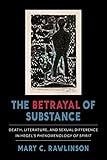The betrayal of substance : death, literature, and sexual difference in Hegel's "Phenomenology of spirit" / Mary C. Rawlinson.
Material type: TextPublication details: [New York : Columbia University Press], (c)2020.Description: 1 online resourceContent type:
TextPublication details: [New York : Columbia University Press], (c)2020.Description: 1 online resourceContent type: - text
- computer
- online resource
- 9780231552929
- B2929 .B487 2020
- COPYRIGHT NOT covered - Click this link to request copyright permission: https://lib.ciu.edu/copyright-request-form
| Item type | Current library | Collection | Call number | URL | Status | Date due | Barcode | |
|---|---|---|---|---|---|---|---|---|
 Online Book (LOGIN USING YOUR MY CIU LOGIN AND PASSWORD)
Online Book (LOGIN USING YOUR MY CIU LOGIN AND PASSWORD)
|
G. Allen Fleece Library ONLINE | Non-fiction | B2929 (Browse shelf(Opens below)) | Link to resource | Available | on1147952634 |
Includes bibliographies and index.
"Few works have had the impact on contemporary philosophy exerted by Hegel's Phenomenology of Spirit. Twentieth-century philosophers in France were bound together by a reading of Hyppolite's translation and commentary. Sartre, Merleau-Ponty, Lacan, and Bataille were all shaped by Kojève's lectures on the book. Late twentieth-century philosophers such as Derrida, Lyotard, Deleuze, and Irigaray all operate against a Hegelian horizon. Similarly, in Germany Heidegger, Adorno, and Habermas developed their philosophies in large part through an engagement with Hegel. In the United States the book has had a profound influence on feminism and gender studies. Thinkers as diverse as Butler, Benhabib, Mills, and Honig have developed political theories as well as theories of sexual difference by rereading Hegel's reading of Antigone. As Derrida suggests, this text must be read. It lays out the infrastructures and architectures of life in the modern nation state. It unfolds a grand narrative of the ways of thinking and acting that comprise human experience in "our time." The purpose of the text is to effect a transformation in readers, so that they cease to think of themselves as particular humans and come to know that their existence inheres in membership in a complex community-social, cultural, economic, religious, aesthetic, and political infrastructures that form the culture of possibilities in which self-consciousness emerges and is sustained. Rawlinson's reading reveals how Hegel's politics of the "we" is undermined both by his effacement of sexual difference and by his misappropriation of art as a "betrayal of substance." Both of these gestures discount specificity in favor of a generic subject and a mutual recognition in which the other is the same. She uses Hegel's own critique of abstraction against him to rethink the "we" as a community of difference, figured materially in the differentiated styles or signatures of art, and in so doing argues that that the task of phenomenology is never completed and that the abstract concepts of logic will always be dependent on phenomenology's productive or generative movement. In her reading Hegel is neither a metaphysician nor a subjective idealist. He is a phenomenologist, analyzing experience to articulate the ways in which humans generate narratives and material infrastructures to sustain the complexities of life"--
COPYRIGHT NOT covered - Click this link to request copyright permission:
There are no comments on this title.
